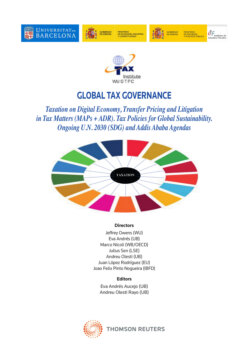Читать книгу Global Tax Governance. Taxation on Digital Economy, Transfer Pricing and Litigation in Tax Matters (MAPs + ADR) Policies for Global Sustainability. Ongoing U.N. 2030 (SDG) and Addis Ababa Agendas - Jeffrey Owens - Страница 35
На сайте Литреса книга снята с продажи.
CONCLUSION
ОглавлениеTax fraud is a large and persistent problem. The path of big data analytics supplemented by machine learning is showing benefits in reducing all forms of noncompliance including fraud. However, fraudsters are adapting, leveraging a digital economy constantly reinventing itself with new business models emerging continuously to find cracks in the voluntary compliance approach. Further, with cybersecurity an ever-present challenge, it may be time to re-think whether massive data collection is the path we want to travel. Top tax leaders have painted a vision of an alternative rooted in secured systems and cooperative compliance. But only now with the emergence of machine learning and blockchain based cryptography has there been a realistic opportunity to pursue what we might call a path less travelled. The emergence of systems supporting central bank digital currencies may make all the difference.
27.OECD, Global Revenue Statistics Database, https://stats.oecd.org/Index.aspx?DataSetCode=RS_GBL, Accessed 3.2.21
28.World Bank, 2019 GDP (current US$), https://data.worldbank.org/indicator/NY.GDP.MKTP.CD, Accessed 3.2.21
29.European Commission, VAT GAP, https://ec.europa.eu/taxation_customs/business/tax-cooperation-control/vat-gap_en, Accessed 3.2.21
30.US GAO, Enforcement of Tax Laws – High Risk Issue, https://www.gao.gov/key_issues/tax_laws/issue_summary, Accessed 3.2.21
31.British Tax Review, Taxing Earnings from the Platform Economy: An EU Digital Single Window for Income Data?, p 82-101, 2020.
32.Business Insider, How porn has been secretly behind the rise of the internet and other technologies, https://www.businessinsider.com/porn-behind-internet-technologies-2017-5, Accessed 3.2.2021.
33.Prof. Richard Ainsworth, Digitalization of the Tax Function: The Perspective of Business and Tax Administration, Digital Economy Taxation session presentation, 12.12 2020.
34.OECD, Shining Light on the Shadow Economy: Opportunities and Threats, 2017.
35.OECD, Electronic Sales Suppression: A Threat to Tax Revenues, 2013.
36.Interpol, Environmental Crime Program Guide to Carbon Trading Crime, p19, 2013.
37.European Commission, VAT Fraud: New tool to help EU countries crack down on criminals and recoup billions, 2019.
38.Penemon Institute, Cybersecurity in Public Sector: 5 Insights You Need to Know, p3, 2019.
39.OECD FTA, Tax Administration 3.0: The Digital Transformation of Tax Administration, 2020
40.Economist, The promise of the blockchain - The Trust Machine, Oct 2015 cover story.
41.Oasis Open, Baseline, https://www.baseline-protocol.org/ Accessed 3.2.2021.
42.Binance Academy, zk-SNARKs and zk-STARKs Explained, Accessed 3.2.2021.
43.OECD, Co-operative Compliance: A Framework, 2013.
44.OECD, Tax Compliance by Design, 2014.
45.OECD FTA, Tax Administration 3.0: The Digital Transformation of Tax Administration, 2020.
46.Coindesk, Visa May Add Cryptocurrencies to Its Payments Network, Says CEO, 30.1.2021, Accessed 3.2.21.
47.BIS, Digital currencies and the future of the monetary system, 27.1.21.
48.Center for New American Security, China’s Digital Currency: Adding Financial Data to Digital Authoritarianism, 1.2021.
49.OECD, Tax Administration 2019: A blockchain scenario study, p 193- 202, 2019.
